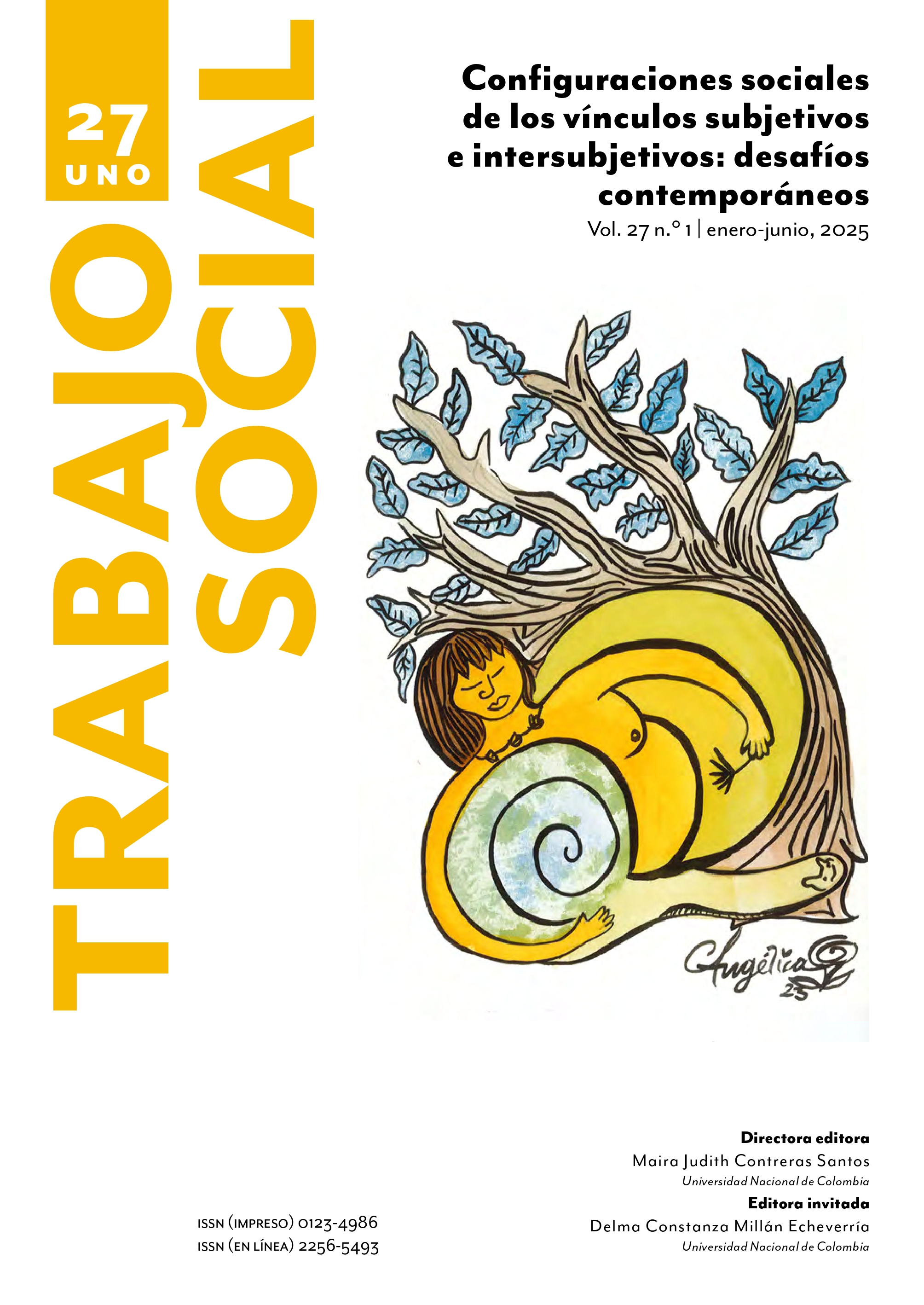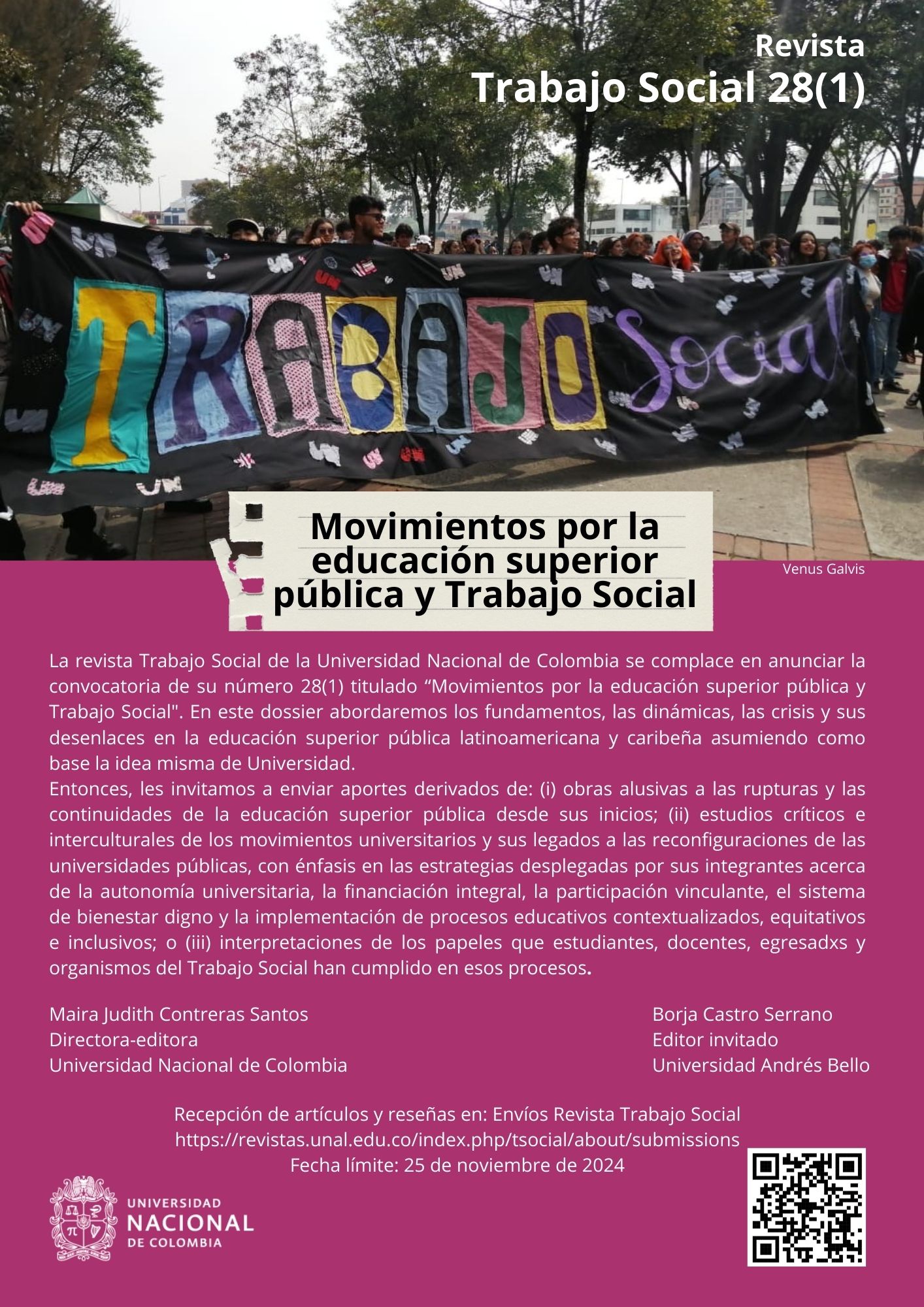Construcción social, vínculos intersubjetivos y sujetos situados: el caso de los “escuadrones de la muerte” en las calles del sur de Veracruz, México
Social Construction, Intersubjective Bonds, and Situated Subjects: The Case of Death Squads in the Streets of Southern Veracruz - Mexico
ituados: o caso dos esquadrões da morte nas ruas do sul de Veracruz - México
DOI:
https://doi.org/10.15446/ts.v27n1.113574Keywords:
calles, construcción social, contexto, cotidianidad, intersubjetividad, sujetos (es)Streets, social construction, context, everyday, intersubjective, subjects (en)
Ruas, construção social, contexto, intersubjetivo, cotidiano (pt)
Downloads
El presente estudio se interna en el mundo subjetivo y cotidiano de un grupo de sujetos que se caracterizan por vivir y beber en las calles de la región sur de Veracruz - México, culturalmente conocidos como escuadrones de la muerte. Desde la perspectiva metodológica, con abordaje cualitativo, de corte comprensivo-narrativo, se apuntala en los supuestos del construccionismo social, se implementa una estrategia de amistad y se aplican entrevistas no estructuradas. Los resultados revelan que el contexto y el grupo de individuos brindan mayor solidaridad, afecto y cohesión que las familias de origen, al compartir sus historias con sus iguales, lo cual hace que se vinculen intersubjetivamente y, en consecuencia, persistan en las calles.
The present study is qualitative, comprehensive-narrative and supported by the assumptions of social constructionism. It sinks its roots into the subjective and everyday world of a group of subjects who are characterized by living and drinking in the streets of the southern region of Veracruz, Mexico. Culturally known as “Death Squads”. From the methodological perspective, the
friendship operation and application of unstructured interviews were used. The results reveal that the context and the same group of individuals provide greater solidarity, affection and cohesion than the families of origin themselves when sharing their stories with their peers; intersubjectively linking and, consequently, persisting in the streets.
O presente estudo é qualitativo, de narrativa abrangente e amparado nos pressupostos do construcionismo social. Afunda suas raízes no mundo subjetivo e cotidiano de um grupo de sujeitos que se caracteriza por viver e beber nas ruas da região sul de Veracruz, no México. Culturalmente conhecidos como “Esquadrões da Morte”. Do ponto de vista metodológico, utilizou-se a operação de amizade e aplicação de entrevistas não estruturadas. Os resultados revelam que o contexto e o mesmo grupo de indivíduos proporcionam maior solidariedade, afeto e coesão do que as próprias famílias de origem ao partil harem as suas histórias com os seus pares; vinculando-se intersubjetivamente e, consequentemente, persistindo nas ruas.
References
Alexander, J.C. (1990). La centralidad de los clásicos. En A. Giddens y J. Turner, La teoría social hoy. Alianza Universidad.
Gergen, K. (1996). Realidades y relaciones. Aproximaciones a la construcción social. Paidós
Lyotard, Jean-François (1991). La condición posmoderna. Cátedra.
Torres, A. y Azocar, J.C. (2000). Subjetividad y sujetos sociales en la obra de Hugo Zemelman. Revista de la facultad de Arte y Humanidades. Segunda época, 12 (2), 1.18. https://revistas.pedagogica.edu.co/index.php/RF/article/view/5841/4825
Schutz, A. (2003), El problema de la realidad social. Escritos 1. Amorrortu
Valiente, S.C. (2021). Ser sujeto implicado y situado en la investigación. Revista cambios y Permanencias, 12(2), 195-210.
Zemelman, H. (2010). Sujeto y subjetividad: La problemática de las alternativas como construcción posible. Polis, 27(1), 1-11. http://journals.openedition.org/polis/943
How to Cite
APA
ACM
ACS
ABNT
Chicago
Harvard
IEEE
MLA
Turabian
Vancouver
Download Citation
License
Copyright (c) 2025 JULIO JIMÉNEZ-HERRERA

This work is licensed under a Creative Commons Attribution-NonCommercial-NoDerivatives 4.0 International License.
Upon notification of the publication of the article, the author or authors will be asked to fill out the declaration of originality and compliance with ethical principles. The author or authors thus grant property rights to the journal, but preserve the moral rights over the publication. The dissemination and commercialization of the contents do not result in economic profits for either of the parties.
Trabajo Social is published under a Creative Commons license (https://creativecommons.org/licenses/by-nc-nd/4.0/). Journal articles are available on line at: www.revtrabajosocial.unal.edu.co, and they may be reproduced or copied according to the conditions of said license.
On the other hand, the journal cannot be held responsible for the contents of the articles or the affirmations of the authors, given that each publication's perspective for analysis might disagree with other opinions. The contents and perspectives of the articles cannot be considered to represent the University's institutional views or those of the journal.



























